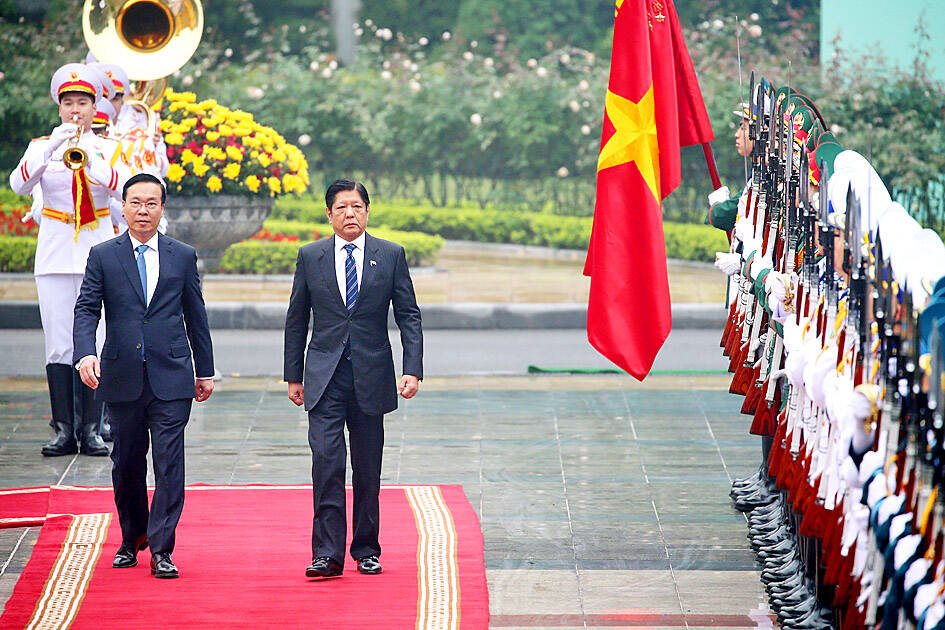Vietnam and the Philippines yesterday agreed to boost cooperation between their coast guards and to prevent untoward incidents in the South China Sea, in an announcement during a state visit to Hanoi by Philippine President Ferdinand Marcos Jr.
The two Southeast Asian nations have competing claims over some parts of the South China Sea, a conduit for US$3 trillion of annual ship-borne trade that China claims almost in its entirety.
The two memoranda of understanding on security covered “incident prevention in the South China Sea” and “maritime cooperation” among coast guards, said a Vietnamese official who announced the deals during a formal ceremony at the presidential palace.

Photo: EPA-EFE
The agreements in Hanoi could risk angering Beijing, especially if they pave the way for compromises on disputed claims. China tends to view progress in the resolution of border disputes among other claimants with skepticism.
Both Hanoi and Manila have had run-ins with China’s coast guard, but altercations have been frequent in the past year between the vessels of China and US ally the Philippines, adding strain to deteriorating relations.
The maritime cooperation deal aims to establish a comprehensive partnership between the two coast guards on capacity building, training, and personnel and ship exchanges to improve their ability to run operations together, according to Marcos’ remarks at a meeting with Vietnamese Prime Minister Pham Minh Chinh.
“The South China Sea remains a point of contention,” Marcos said at the meeting. “We are firm in defending our sovereignty, sovereign rights and jurisdiction against any provocations, but at the same time, we are also seeking to address these issues with China through peaceful dialogue and consultations as two equal sovereign states.”
Before meeting Vietnamese President Vo Van Thuong, Marcos said Vietnam was “the sole strategic partner of the Philippines” in Southeast Asia, adding that maritime cooperation was the foundation of that relationship.
“The world and regional situation is evolving in a rapid and complicated manner, and therefore we need to unite and cooperate more closely,” Chinh said, adding that Marcos’ visit would help to boost bilateral relations.
Vietnam, one of the world’s biggest rice exporters, also sealed agreements with the Philippines, a top importer of the grain, covering rice trade and agriculture cooperation.
On his two-day visit to Hanoi, Marcos is meeting Vietnamese leaders, but not Vietnamese Communist Party General Secretary Nguyen Phu Trong, according to official schedules, in what would be Trong’s third consecutive absence from meetings with visiting leaders this month.
Before meeting Vietnamese political leaders yesterday, Marcos met Pham Nhat Vuong, the head of Vingroup, Vietnam’s largest conglomerate, on Monday.
The company yesterday said that its electric vehicle unit VinFast would open a business network in the Philippines.
Marcos said the Philippines could help produce batteries for electric vehicles, thanks to its reserves of cobalt, copper and nickel, Vingroup said in a statement.
Marcos said the two nations are aiming to increase bilateral trade to US$10 billion from US$7 billion.

SECURITY: As China is ‘reshaping’ Hong Kong’s population, Taiwan must raise the eligibility threshold for applications from Hong Kongers, Chiu Chui-cheng said When Hong Kong and Macau citizens apply for residency in Taiwan, it would be under a new category that includes a “national security observation period,” Mainland Affairs Council (MAC) Minister Chiu Chui-cheng (邱垂正) said yesterday. President William Lai (賴清德) on March 13 announced 17 strategies to counter China’s aggression toward Taiwan, including incorporating national security considerations into the review process for residency applications from Hong Kong and Macau citizens. The situation in Hong Kong is constantly changing, Chiu said to media yesterday on the sidelines of the Taipei Technology Run hosted by the Taipei Neihu Technology Park Development Association. With

CARROT AND STICK: While unrelenting in its military threats, China attracted nearly 40,000 Taiwanese to over 400 business events last year Nearly 40,000 Taiwanese last year joined industry events in China, such as conferences and trade fairs, supported by the Chinese government, a study showed yesterday, as Beijing ramps up a charm offensive toward Taipei alongside military pressure. China has long taken a carrot-and-stick approach to Taiwan, threatening it with the prospect of military action while reaching out to those it believes are amenable to Beijing’s point of view. Taiwanese security officials are wary of what they see as Beijing’s influence campaigns to sway public opinion after Taipei and Beijing gradually resumed travel links halted by the COVID-19 pandemic, but the scale of

A US Marine Corps regiment equipped with Naval Strike Missiles (NSM) is set to participate in the upcoming Balikatan 25 exercise in the Luzon Strait, marking the system’s first-ever deployment in the Philippines. US and Philippine officials have separately confirmed that the Navy Marine Expeditionary Ship Interdiction System (NMESIS) — the mobile launch platform for the Naval Strike Missile — would take part in the joint exercise. The missiles are being deployed to “a strategic first island chain chokepoint” in the waters between Taiwan proper and the Philippines, US-based Naval News reported. “The Luzon Strait and Bashi Channel represent a critical access

Pope Francis is be laid to rest on Saturday after lying in state for three days in St Peter’s Basilica, where the faithful are expected to flock to pay their respects to history’s first Latin American pontiff. The cardinals met yesterday in the Vatican’s synod hall to chart the next steps before a conclave begins to choose Francis’ successor, as condolences poured in from around the world. According to current norms, the conclave must begin between May 5 and 10. The cardinals set the funeral for Saturday at 10am in St Peter’s Square, to be celebrated by the dean of the College